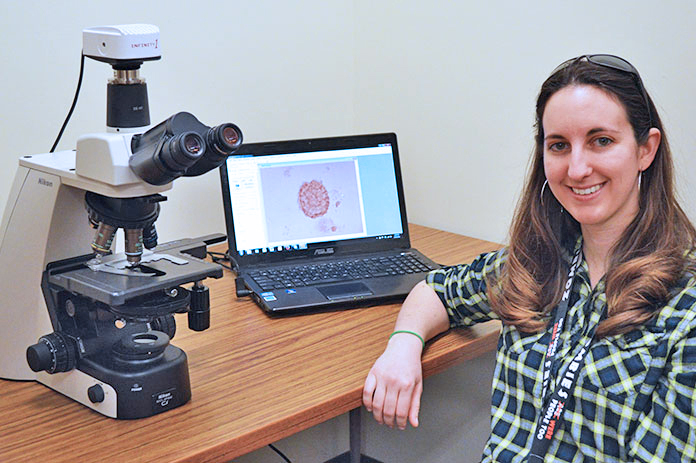
Johnica Morrow, an applied ecology doctoral student, is the co-author of a monograph that describes all of the coccidian species known to infect turtles worldwide. Coccidia are protozoan parasites – microscopic, one-celled organisms found in a wide range of vertebrate hosts.
"Coccidia are amazingly diverse parasites that are abundant among anapsid reptiles," Morrow said. "The monograph highlights the gaps in the scientific community's knowledge of these host-parasite interactions so that researchers can develop meaningful future studies with a thorough understanding of the existing literature."
As a graduate student at Midwestern State University in Wichita Falls, Texas, Morrow worked with Donald Duszynski, professor emeritus at the University of New Mexico, to collect all of the published literature on turtle coccidia.
"My co-author did the majority of the literature searching, while I did the majority of entering data into the manuscript," Morrow said. "We have both worked on the writing, which has been quite an adventure."
After four years of data collecting, writing and editing, their work is slated for publication in June 2014. "The Biology and Identification of the Coccidia (Apicomplexa) of Turtles of the World," is the most comprehensive review of turtle coccidia to date.
Morrow said that the project underscores how little is actually known about the subject overall.
"We still have a lot to learn about these parasites," she said. "We hope that the monograph will be a source for assisting in the identification of these parasites, as well as a guide to understanding where additional work is needed to fill the voids in our knowledge of the subject."
Morrow’s background in organismal biology fuels her interest in parasites, and led her to UNL's School of Natural Resources where she's currently studying archaeological materials for parasites and dietary remains, such as pollen.
"Diet and parasitism are intrinsically linked, so learning about dietary analysis is still important for understanding the things that I want to focus on studying," Morrow said. "I want to increase my skill set to develop a career as a multifaceted parasitologist."
— Mekita Rivas, Natural Resources